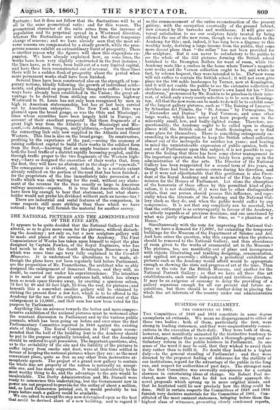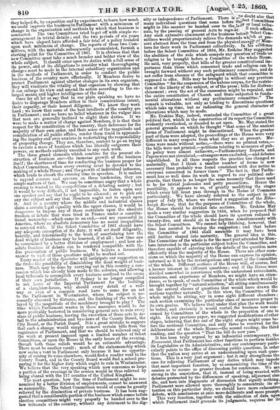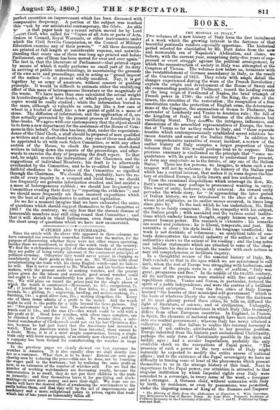BUSINESS OF PARLIAMENT.
THE COMMITTEE ov 1861.
THE Committees of 1848 and 1854 constitute in some degree exemplaria ad evitanda. We mean no disparagement to either of those two bodies ; both of them, particularly the first, were strong in leading statesmen, and they were unquestionably consci- entious in the execution of their duty. They were both of them however, most manifestly animated by the instinctive tendency tO avoid change, rather than to accomplish a thorough-going and sa- tisfactory reform in the public business in Parliament. In one sense of the word it may be said, that they wished to avoid their duty rather than to fulfil it. No doubt they looked to a higher duty—to the general standing of Parliament ; and they were directed by the properest feeling of deference for the stability of our institutions' regard for the advantage of the public in the long run, and respect for authorities of past days. The strongest man in the first Committee was avowedly conspicuous for a certain slowness in entertaining ideas of change. Sir Robert Peel de- clared, more than once, that he did not readily approach the novel proposals whioh sprung up in more- original minds, and that he hesitated until he saw precisely how the thing could be done. Still in certain respects the Committees of 1848 and 1854 furnish very decisive materials for the Committee of 1861. Con- stituted of the most eminent statesmen, bringing before them the highest class of witnesses, presenting closely condensed reports, they helped de, by exposition and by experiment, to learn how much we could improve the busiewsw:MPafilanient with a minimum of change in the organization-and methods by which that business is conducted. The two Committees tried to get off with simple re- arrangement in trivial details • and the two periods of six years which have elapsed have afforded a fair trial of a policy founded upon such minimma of change. The reports of those two Com- mittees with the materials subsequently, accumulated, furnish a starting point for the Committee of 1861. It is obvious that that new Committee masttake a much broader and bolder view of the whole subject. It ahould enter upon its duties with a full sense of its power, and of its obligations to consider what thoroughgoing clanges must be made in the internal subsidiary organization and in the methods of Parliament, in order to conduct the public business of the country mere effectually. If Members desire to protect Parliament against ulterior changes in its own organism, they will vindicate the vitality of that organism by showing that it can enlarge its view and. amend its action according to the en- larged means and higher intelligence of the day. Once for all let us say that in our plain speaking we have no desire to disparage Members either in their conscientious intent, their capacity, or their honest diligence. We know they work hard ; we know that some of the best intellects of the country are in Parliament; and we have no belief whatever in the vulgar idea that men are generally inclined to slight their duties. If we were to make a matter of charge against Members it is that their respect for the constitution of the country, their deference for the majority of their own order, and their sense of the magnitude and complication of all public affairs, render them timid in approach- ing the inquiry and over anxious in undertakimi the responsibility of proposing change. They are, therefore' content to go on trying to execute a mass of business which has literally outgrown their powers' on methods entirely unsuited to any such work. The three grand elements which combine for the present ob- struction of business are—the immense growth of the business itself; the shortness of time for conducting the business proper for Select Committees, when every evening must be devoted to the making of a -whole House; and the growth of individual influence, which tends to absorb the evening time in speeches. It is useless to expend censure and sarcasm on these tendencies they are simple matters of fact. We may be sometimes angry that a whole evening is wasted in the competitions of a debating society ; but it would be very difficult, if not impossible, to fasten. upon any one speaker and say that he ought to be silenced ; or to pick out any one subject and say that Members ought not to speak upon it. And in a country where the middle and industrial classes claim a certain lcgal equality with the upper classes, it would be dangerous to impose any of those restraints upon the absolute freedom of debate that were tried in France under ei constitu- tional monarchy—which came to an end,—and are successful in America, where an absolute democracy has no social inequalities to contend with. If the Select Committee of 1861 should have any adequate conception of its duty, it will set itself diligently, heartily, and determinedly to the work of ascertaining how the dead weight of business may be lessened, if at all ; how time can be economized by a better aivision of employment ; and how ab- solute freedom of debate can be rendered compatible with the due prosecution of public business. We believe a favourable I answer to each of those questions might be worked out. Every reader of the Spectator will anticipate our suggestion on the first—the possibility of diminishing the dead weight of busi- ness. Much may be done by carrying out in this country- a con- cession which has already been made to the colonies, and allowing local tribunals to accomplish every business confined to the arena of their own jurisdiction. If Sydney is no longer compelled to ask leave of the Imperial Parliament for the building of a slaughter-house, why should every detail of a rail- way or even of a common road have to come for an act to the Parliament in Westminster, where the subject is ne- cessarily obscured by distance, and the finishing of the work de- layed. by the magnitude of the machinery brought to play ? The time Which Parliament wastes in these measures would be far more profitably bestowed in considering general acts to rule every class of public business, leaving the execution of those acts in de- tail to the administration and bye-laws of. the County Board, the City Board, or the Parish Board. It is a great mistake to suppose that such a change would simply remove certain bills from the cognizance of Parliament, and that we should be relieved only of the work at present imposed upon a limited number of Select Committees, or upon the House in the early hours of the evening, though both those reliefs would be an estimable advantage. There must be another result; much of the statesmanship which now seeks a vent in Parliament only because it has no opportu- nity of raising its voice elsewhere, would find a readier vent in the County Board and in the County Board would find a school pre- paring it for the higher duty which ought to rule in Westminster. lire believe that the very speaking which now consumes so large exertion of the evenings in the session would be thus relieved by being shared with the 117 counties of the United Kingdom. The next question, how the time of Parliament might be eco- nomized by a better division of employments, cannot be answered so summarily. The Select Committees would of course be greatly relieved by the diminution of private business. It has been sug- gested that a considerable portion of the business which comes before election committees might very properly be handed over to the law tribunals of the country, without any detriment to the dig-
nity that many or independence of Parliament. There 82
many individual questions that come before 8190' or local tribu- might in like manner be handed over to the la • nals, by the passing of general Acts to rege:Iit: ,11 VA affairs. Any such extensive abatement of the business before. '3e„1eet Com- mittees would proportionately relieve the demands whilen at_pre- sent abstract from the time and from the physical eneretef Mem- bers for their work in Parliament collectively. In his evdenee before the Select Committee of 1854, Mr. Erskine May suggested the abolition of the rule which compels any question of trade or religion to be brought before a Committee of the whole House. He said, very properly, that bills of far greater constitutional im- portance than those which concerned trade and religion can be brought forward without any such preliminary committee, and do not suffer from absence of the safeguard which that committee is supposed to offer. Bills may be brought in -without any previous Committee "far the suspension of the habeas corpus, for the restric- tion of the liberty of the subject, or of the press ; bills for disfran- chisement; even the act of the succession might be repealed, and the entire constitution of Church and State subjected to funda- mental alterations without any preliminary committee." The remark is valuable, not only as tending to discontinue questions which take up time, but as indicating the general character of alterations which may be made. Mr. Erskine May, indeed, reminded the Committee of a great political fact, which in the construction of its report the Committee evidently overlooked, or dreaded to not upon. Mr. May stated the general grounds on which he thought "that some of the ancient forms of Parliament might be discontinued. When the greater part of them were adopted, the proceedings of the House were very different in many respects from what they are at resent. Mo- tions were made without notice,—there were no prmted votes,— the bills were not printed,—petitions relating to measures of pub- lic policy were almost unknown,---Parliamentary Reports and Papers were not circulated,—strangers were excladed,—and debates unpublished. In all these respects the practice has changed se materially, that I think a smaller number of forms is now necessary than probably was found consistent with due notice in everyone concerned in former times." The fact is, that Parlia- ment has so well done its work in regard to our political safe- guards, that there is no longer the same necessity that there used to be for trivial jealousies and petty precautions. Hence the possibility, it appears to us, of greatly, modifying the stages which every bill must pass through iu the House of Commons particularly. We 'have already referred to the subject in our paper of July 28, where we revived a suggestion of the Edin- burgh Review, that for the purposes of Committee of the whole, the House should be divided into sections. Mr. Erskine May made a very similar suggestion in 1854, when he proposed that the Committee of the whole should have its quorum reduced to twenty-five, and should sit in the daytime simultaneously with the Select Committees. We cannot help thinking, however, that time has assisted to develop the suggestion ; and that before the Committee of 1861 shall assemble it may have been still further shaped into maturity. The general idea is this. The Committee of the whole is for the most part attended by Mem- bers interested in the particular subject before the Committee, and therefore capable of enterine6 into the details of the question more efficiently than the majority of the House. There are other occa- sions on which the majority of the House can express its opinion informed as it is by the investigations and report of the Committee of the whole. Different sections of the House will, of course, feel a keener interest in Cifferent 'questions ; and if the House were divided somewhat in accordance with the understood antecedents, vocations, and experience of Members, we might have an atten- dance, so to speak, of each Committee of the whole which would be brought together by "natural selection," all sitting simultaneously on the several classes of questions that would have drawn the sections together naturally. In this view, the Committee of the whole might be sitting, say in some eight different chambers ; each section examining the particular class of measures proper to its own genius. We believe that under that plan the work would be better, and obviously it would curtail the business now con- sumed by Committees of the whole in the proportion of one to eight. In our previous paper, we suggested modifications of other stages, believing that five out of the eight stages might come be- fore the sectional Committee, and only three be reserved for the deliberations of the whole House—the second reading, the third reading, and the question "That the bill do now pass." It has been truly argued by an influential contemporary, the Economist, that Parliament has other functions to perform besides its Legislative or its Administrative, and our contemporary parti- cularly points to the office of discussing public questions, in order that the nation may arrive at an understanding upon such ques- tions. This is a very just argument ; but it only strengthens the case for relieving Parliament of any duties which may impede that most important function, by so economizing the time of the session as to secure us greater freedom for conference. We are strong in the conviction, that if, instead of being wearied with debates protracted by the diffuseness of speaking, adjourned sine die, and torn into fragments of discussion that signify nothing, Parliament were allowed more thoroughly to concentrate its at- tention on this particular duty, we should have more exhaustive debate, with conclusions at once more deliberate and more prompt. This very function, together with the collection of data upon which Parliament itself grounds its judgments, requires for its
perfect execution an improvement which has been discussed with ' comparative frequency. A portion of the subject was touched
this week by our ministerial contemporary, the Globe. An able al that paper took up a recent return moved for by Lord 1...wert Cecil, who called for "Copies of all Acts or parts of Acts, Orders in Council, Royal Warrants, or other instruments under which the Civil Service Commission, or the Council of Military Education exercise any of their powers." "AU these documents are printed at full length at considerable expense, and notwith- standing that every one of them was long ago printed and before Parliament, one of them has been moved for over and over again." The fact is, that the literature of Parliament—that printed organ by means of which it really performs no small part of its duty in arriving at public understandings, in ascertaining the grounds of its own acts and proceedings, and in acting as grand inquest of the nation "—is at present wholly unedited. Nay, it is got together by an army of amateurs, without concert or guiding principle. It would be difficult to estimate either the stultifying effect of this mass of heterogeneous literature or the magnitude of the waste. We have more than once calculated the actual weight in hundredweights of blue-books, of which perhaps not a dozen copies would be really studied ; while the information buried in the mass, although as valuable as corn, lay like a few ears of wheat in a bushel of chaff, like a few grains of gold in a mass of stone. The diffusion of information, and the application of it, are thus actually prevented by the present process of fossilizing it in blue-books. We agree with our contemporary that the object should be to form a new department for the assistance of the House of Com- mons in this behalf. Our idea has been that, under the superinten- dence of the Chief Clerk, a staff should prepared of men qualified as writers and as short-hand writers. Any one of these men should be appointed to sit with each Select Committee, or with any other section of the House, to, check the journeymen short-hand writers in taking down the reports of the proceedings, and after- wards to exercise the duty of preparing the draft report. To that end, he might receive the instructions of the Chairman and the suggestions of individual Members ; his draft to be afterwards overhauled by the Committee, and to be re-edited by himself in faithful obedience to the wishes of the Committee as signified through the Chairman. We should, then, probably, have the re- sults of every inquiry in a compact and lucid form; we should less frequently see genuine information crushed and lost amidst a a mass of heterogeneous rubbish ; we should less frequently see Committees evading their duty by "reporting the evidence"; ; and we should more frequently see those succinct expositions which are the best of all preliminaries to action and legislation. Do we for a moment imagine that we have exhausted the series of questions which should suggest themselves to the Committee of 1861? On the contrary, we only fear that the chronic disease of honourable members may still cling round that Committee • and that it will shrink in timid listlessness, even from entertaining the short array of questions which we have now enumerated.




























 Previous page
Previous page